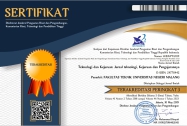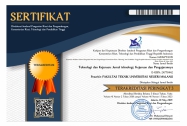Teaching Factory Learning Model as Income Generating Unit with Marketable Products in Public Vocational High School
Abstract
Keywords
Full Text:
PDFReferences
Azman, A., Simatupang, W., Karudin, A., & Dakhi, O. (2020). Link and Match Policy in Vocational Education To Address the Problem of Unemployment. International Journal of Multi Science, 1(6), 76–85.
Choi, S. (2020). Impact of family background and individual characteristics on vocational high school choice in south korea: A gender analysis. Journal of Technical Education and Training, 12(4), 16–26. https://doi.org/10.30880/jtet.2020.12.04.002
Hernie Kumaat. (2010). Persepsi Masyarakat Terhadap Sekolah Menengah Kejuruan (SMK) Sebagai Upaya Memasuki Dunia Kerja. Konvensi Nasional V Asosiasi Pendidikan Teknologi Dan Kejuruan Indonesia, 1907–2066, 501–506.
Ilyas. (2016). Pendidikan Karakter Melalui Homeschooling. Journal of Nonformal Education, 2(1). https://doi.org/10.15294/jne.v2i1.5316
Irwansyah, I., Harus, C. Z. H. C. Z., & Ibrahim, S. I. S. (2018). Manajemen Kelas Dalam Proses Pembelajaran Sejarah Di Sman 8 Kota Banda Aceh. Jurnal Serambi Ilmu, 14(2), 85–91. http://ojs.serambimekkah.ac.id/index.php/serambi-ilmu/article/view/540
Kästner, C., & Kang, E. (2020). Teaching Software Engineering For AI-Enabled Systems. 2020 IEEE/ACM 42nd International Conference on Software Engineering: Software Engineering Education and Training (ICSE-SEET), 45–48. https://doi.org/10.1145/3377814.3381714
Kevin, B. (2020). Assessing Individual Contributions To Software Engineering Projects With Git Logs And User Stories. Proceedings of the 51st ACM Technical Symposium on Computer Science Education, 650–656. https://doi.org/10.1145/3328778.3366948
Khosiah, Hajrah, & Syafril. (2017). Persepsi Masyarakat Terhadap Rencana Pemerintah Membuka Area Pertambangan Emas di Desa Sumi Kecamatan Lambu Kabupaten Bima. Jurnal Ilmu Sosial Dan Pendidikan, 1(2), 141–149.
Lizawati. (2016). Kegiatan Liqᾱ’ Dalam Menanamkan Moralitas Remaja Di SMKN 1 Jenangan Ponorogo. Program Studi Pendidikan Agama Islam Negeri (STAIN) Ponorogo, 1–88.
Mavrikios, D., Georgoulias, K., & Chryssolouris, G. (2018). The Teaching Factory Paradigm: Developments and Outlook. Procedia Manufacturing, 23(2017), 1–6. https://doi.org/10.1016/j.promfg.2018.04.029
Mourtzis, D., Boli, N., Dimitrakopoulos, G., Zygomalas, S., & Koutoupes, A. (2018). Enabling Small Medium Enterprises (SMEs) to improve their potential through the Teaching Factory paradigm. Procedia Manufacturing, 23(2017), 183–188. https://doi.org/10.1016/j.promfg.2018.04.014
Mourtzis, D., Vlachou, E., Dimitrakopoulos, G., & Zogopoulos, V. (2018). Cyber- Physical Systems and Education 4.0 -The Teaching Factory 4.0 Concept. Procedia Manufacturing, 23(2017), 129–134. https://doi.org/10.1016/j.promfg.2018.04.005
Muhardi. (2005). Kontribusi Pendidikan Dalam Meningkatkan Kualitas Bangsa Indonesia. Journal Unisba, XX (4), 478–492. https://doi.org/10.29313/mimbar.v20i4.153
Mustakim, M., & Sunarsi, D. (2020). Influences of Price, Promotion, and Service quality on Communities’ Interest in Choosing Vocational High School. Journal of Educational Science and Technology, 6(2), 233–243. https://doi.org/10.26858/est.v6i2.15340
Naseer, M., Zhang, W., & Zhu, W. (2020). Early Prediction of A Team Performance In The Initial Assessment Phases Of A Software Project For Sustainable Software Engineering Education. Sustainability (Switzerland), 12(11). https://doi.org/10.3390/su12114663
Prasetya, E. P. (2020). 10 Characteristics of SMK Teachers in the Industrial Era 4.0 (Case Study at SMK Bina Profesi Bogor). Edumaspul Jurnal Pendidikan, 4(1), 50–55.
Rayyan, M., Ismail, R., & Amiruddin. (2019). Penerapan Teaching Factoru Terhadap Hasil Belajar Siswa Kelas XI Pada Mata Pelajaran Las Busur Manual (SMAW) Jurusan Teknik Las SMK Negeri 3 Gowa. Diploma Thesis, Universitas Negeri Makassar.
Saleh, S. (2017). Analisis Data Kualitatif (H. Upu (ed.); 1st ed.). Pustaka Ramadhan, Bandung.
Samani, M. (2018). Vocational Education in the Era of Industry 4.0: An Indonesia Case. 201(Aptekindo), 45–47. https://doi.org/10.2991/aptekindo-18.2018.10
Sampun Adam, Nastiti Rahayu, A. nur A. (2017). Strategi Implementasi Revitalisai SMK (M. Dr. Ir. M. Bakrun, S., Muhammad Soleh, M. Ir. Nur Widyani, M. Ir. Sri Puji Lestari, M. B., Chrismi Widjajanti, S.E., M. Arfah Laidiah Razik, S.H, M. P. Dr. Widarto, & M. K. Drs. Ima Ismara, M.Pd (eds.); I). Direktorat Pembinaan Sekolah Menengah Kejuruan Direktorat Jenderal Pendidikan Dasar dan Menengah Kementerian Pendidikan dan Kebudayaan. http://repositori.kemdikbud.go.id/5263/1/riXIT33kky7AMpjt8Qcz96oWg1ef5ixukA8vozns.pdf
Semerikov, S., Striuk, A., Striuk, L., Striuk, M., & Shalatska, H. (2020). Sustainability In Software Engineering Education: A Case Of General Professional Competencies. E3S Web of Conferences, 10036(E3S Web Conf), 13. https://doi.org/10.1051/e3sconf/202016610036
Siswanto, I. (2011). Pelaksanaan Teaching Factory untuk Meningkatkan Kompetensi dan Jiwa Kewirausahaan Siswa Sekolah Menengah Kejuruan. Seminar Nasional 2011 “Wonderful Indonesia,” 396–404. http://staffnew.uny.ac.id/upload/198212302008121009/penelitian/Pelaksanaan+teaching+factory+untuk+meningkatkan+kompetensi+dan+jiwa+kewirausahaan+siswa+SMK.pdf
SMKN 1 Jenangan Ponorogo. (2020a). SMK N 1 Jenangan (Rencana dan Strategi). https://www.smkn1jenpo.sch.id/index/news/13/rencana-strategi
SMKN 1 Jenangan Ponorogo. (2020b). SMK N 1 Jenangan (Visi Misi SMK N 1 Jenangan). https://www.smkn1jenpo.sch.id/index/news/10/visi-misi-smkn-1-jenangan
SMKN 1 Jenangan Ponorogo. (2020c). SMK N 1 Jenangan The School Of Adiwiyata (Rekayasa Perangkat Lunak). https://www.smkn1jenpo.sch.id/index/news/15/rekayasa-perangkat-lunak
Stavropoulos, P., Bikas, H., & Mourtzis, D. (2018). Collaborative Machine Tool design: The Teaching Factory paradigm. Procedia Manufacturing, 23(2017), 123–128. https://doi.org/10.1016/j.promfg.2018.04.004
Suharno, S., Harijanto, B., & Nugroho Pambudi. (2020). Vocational education in Indonesia: History, development, opportunities, and challenges. Children and Youth Services Review, 115(May), 105092. https://doi.org/10.1016/j.childyouth.2020.105092
Winangun, K. (2017). Pendidikan Vokasi Sebagai Pondasi Bangsa Menghadapi Globalisasi. Jurnal Taman Vokasi, 5(1), 72. https://doi.org/10.30738/jtvok.v5i1.1493
Wiyarsi, A., Pratomo, H., & Priyambodo, E. (2020). Vocational high school students’ chemical literacy on context-based learning: A case of petroleum topic. Journal of Turkish Science Education, 17(1), 147–161. https://doi.org/10.36681/tused.2020.18
Yu, J., Zhang, J., Wu, N., Mei, Y., Zhu, C., Zhang, D., Xiao, G., & Zhu, L. (2020). Construction of Curriculum System for Software Engineering Major under Background of New Engineering - A Case Study of Anhui Sanlian University. IOP Conference Series: Earth and Environmental Science, 510(6). https://doi.org/10.1088/1755-1315/510/6/062032
Zhao, Q., & Wei, L. (2020). OBE Schema Design of Software Engineering Professional Practice Under Background of Engineering Education Professional Certification. Proceedings of the 2020 4th International Seminar on Education, Management and Social Sciences (ISEMSS 2020) OBE, 466(Isemss), 1165–1170. https://doi.org/10.2991/assehr.k.200826.242
DOI: http://dx.doi.org/10.17977/um031v44i22021p131-136
Refbacks
- There are currently no refbacks.
Copyright (c) 2022 Teknologi dan Kejuruan: Jurnal Teknologi, Kejuruan, dan Pengajarannya
Teknologi dan Kejuruan: Jurnal Teknologi, Kejuruan, dan Pengajarannya
E-ISSN 2477-0442 (online)
Contact
Faculty of Engineering, Universitas Negeri Malang (UM)
Jl. Semarang No 5 Malang 65145, Building H5, 1st Floor.
Homepage: http://journal2.um.ac.id/index.php/teknologi-kejuruan
Email: teknologikejuruan.ft@um.ac.id

This work is licensed under a Creative Commons Attribution 4.0 International License.



2.png)
1.png)
1.png)
1.png)
4.png)
1.png)
.png)

3.png)
1.png)
1.png)


